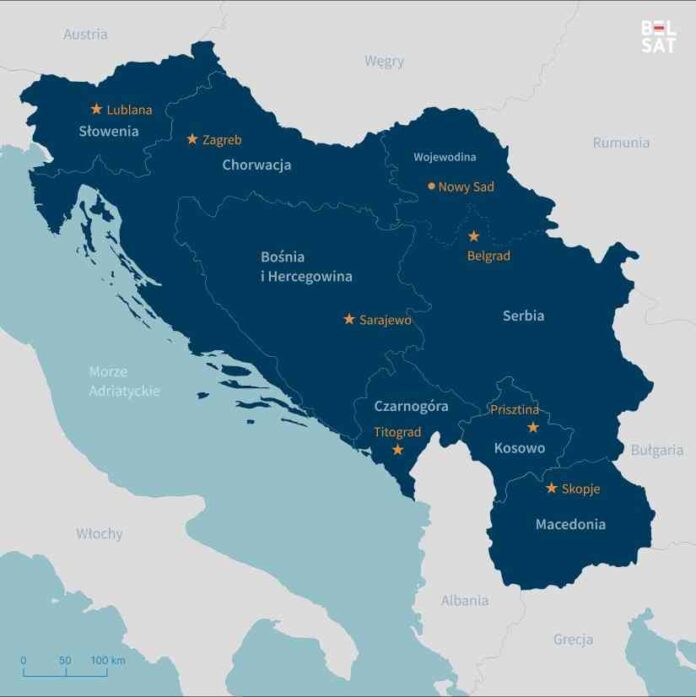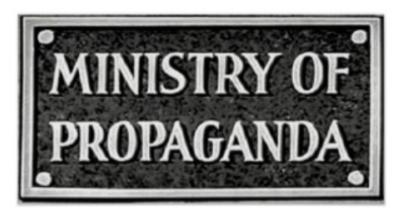Russia has had a strong influence on politics in the region for many years, but the first year of the war demonstrated its impact has limitations. Since Russia’s full-scale aggression against Ukraine began, the Balkan states have had to take a stance on the issue. Although the war in Ukraine may not be a top priority for the local communities, the political leaders understand that its outcome will impact their countries’ futures.
In the first part of this subjective compendium, we discussed how Russian and pro-Russian propaganda used misinformation about Balkan history to justify current aggression in the region. We clarified the omissions in the narration about the wars in former Yugoslavia. In this second part, we will focus on the behavior of individual Balkan countries and societies in response to Russian aggression, not just those of former Yugoslavia.
Croatia
Croatia is a member of NATO and the EU. Most Croats are Catholic, which positions them culturally in the West. More than 80 percent of Croatian society believes Russia is solely responsible for the war in Ukraine. At the same time, only about 30 percent favor training the Ukrainian soldiers in Croatia.
Paradoxically, Croatian President Zoran Milanović has recently taken an even more pro-Russian stance than Serbian President Aleksandar Vučić. He is against training Ukrainian soldiers and frequently speaks out against Ukraine and the West, claiming that the West is causing the conflict to escalate. He has even threatened that Russia will use nuclear weapons. He disagrees with Ukraine’s entry into NATO, criticizes sending weapons to Ukraine, and depicts Ukraine as corrupt. Additionally, he believes that Ukraine will never regain control of Crimea. It contrasts with the views of Prime Minister Andrei Plenković, who supports Ukraine and the West. In fact, Plenković stated last year that the President’s rhetoric sounded like that of a Russian official.
Plenković represents the center-right party Croatian Democratic Union (HDZ). Franjo Tudjman established the party. He is also recognized as the “Founding Father” of Croatian independence and the victorious leader in the war against the Serbs. While the party has its imperfections, it maintains a pro-Western stance.
Milanović’s political background is in the Social Democratic Party, but he currently presents himself as non-partisan. Despite his left-leaning background, he sustains friendly communication and collaboration with the right-wing Prime Minister of Hungary, Viktor Orban.
It is worth noting, however, that the President in Croatia, although elected by universal suffrage, has restricted powers.
The Croatian government sends weapons to Ukraine, especially ammunition and helicopters. An undetermined number of Croatian mercenaries fight in the Armed Forces of Ukraine. Some have already died. Many fighting in Ukraine are veterans of the 1991-95 war.
The war in Ukraine is not the primary concern for Croatian society. Many Croatians view Russia through the prism of Serbia and Ukraine through the lens of their history. However, there are instances of public support for Ukraine, such as from fans of Dinamo Zagreb or Hajduk Split and musician Marko Perković, also known as Thompson. Despite being labeled as a nationalist at times, Perković’s new version of the wartime song “Cavoglava Battle Song” (“Bojna Čavoglave”) was even recorded by Ukrainians.
At the same time, sentiments are strong in Croatia, especially in more minor factions, both on the right and left. If not pro-Russian, then isolationist views. Russian propaganda infiltrated public opinion in previous years, even in Serbia, but on a smaller scale. This narrative was well received, as many people in the former Yugoslavia, including Croats, have consistently shown historical distrust towards the USA. Additionally, there have been numerous Russian investments in Croatia in recent years. However, in other countries, such investments have often been linked to corruption among local elites. Croatia may have encountered similar problems.
Croatia has made progress towards achieving energy independence by constructing a floating terminal on the island of Krk to receive liquefied gas. The initiative was started by the former President of Croatia from the HDZ party, Kolinda Grabar-Kitarović, and the President of Poland, Andrzej Duda, through the Three Seas Initiative. Despite maintaining good relations with Russia at the same time back then, she now strongly opposes its aggression against Ukraine.
Slovenia
Slovenia is an even more modern and more pro-Western country than Croatia. In recent years, it has tended to align with the mainstream of the EU’s Eastern policy.
Slovenia has come a long way since its past and has become a more active country. In March 2022, former Prime Minister Janez Janša, along with the Prime Ministers of Poland and the Czech Republic, visited Kyiv during its siege. Janša had previously served as the Minister of Defense of Slovenia during its fight for independence in 1991.
He was honored with recognition on the Alley of the Courageous in Kyiv.
Janša fell from power a few months later, but another liberal government continued supporting Ukraine. Slovenia sent Ukraine post-Soviet and post-Yugoslav T-55 tanks upgraded to NATO standards. Recently, the current Prime Minister of Slovenia, Robert Golob, and the Prime Ministers of Slovakia and Croatia visited Kyiv and Bucha. During the ceremony in Bucha, he referred to the words of the Ukrainian anthem: “Your banner is now our banner. Together with you, we are also – the Cossack family.”
Serbia
The Serbian nation is widely believed to have a favorable view of Russia. The Serbs from the wars in the former Yugoslavia are also compared with the present-day Russians. There are notable differences between the two ethnicities. Most Serbs in the 1990s did not support aggression in Croatia and Bosnia, or even Kosovo. Thousands of Serbs fought on the Croatian or Bosnian side. There were many Serbs residents in Sarajevo, shelled by Bosnian Serbs. About 1 million people attended the anti-war and democratic demonstration in Belgrade in 1991. Even though Belgrade is smaller than Moscow and Serbia is diminish than Russia, it’s difficult to envision a protest like this happening in modern-day Moscow in the 21st century.
Throughout the regime of Slobodan Milošević, despite repressions and even political assassinations, opposition parties and media functioned. In 2000, the nation removed Milošević from power, and the Serbian state sent him to a tribunal in The Hague. Years later, Serbia also sent other criminals to The Hague – Radovan Karadžić and Ratko Mladić, the leaders of the Bosnian Serbs.
Serbia is a predominantly Orthodox country with a solid cultural and historical connection to Europe. While the Orthodox Church has more political influence than a spiritual one, Serbia has been a part of the European feudal system since the Middle Ages. Serbs live in many Western countries, including Germany, the USA, Canada, and Australia. Interestingly, the Serbian Diaspora has been inhabiting Western countries much longer than the Russian ones.
For several years, there has been a noticeable rise in nationalist and anti-Western opinion in Serbia. Surprisingly, Serbians are now more nationalistic and anti-Western than during the conflicts of the 1990s. Partly due to Russia’s influence on public opinion through propaganda.
The pro-Russian narrative is mainly spread on the Internet and is backed by two key factors. The first is the resentment felt by many Serbian citizens who view the country as a victim of the West. The second factor is the similarity between modern Moscow propaganda and the propaganda used by the regime of Slobodan Milošević, who was responsible for wars and crimes in the former Yugoslavia. It’s possible to argue that the Kremlin and its misinformation institutions were inspired by the propaganda tactics of the Belgrade regime from the 1980s and that they were developing hybrid warfare as we know it today during that time.
Russia uses the same slogans like the fight against Nazism, NATO, imaginary crimes against civilians that need to be defended, fake news about killing babies, hiding aggression behind separatist actions, the concept of brotherly nations, and the alleged affectation of nations Croatian or Bosnian.
It is also necessary to distinguish the state – Serbia – from Republika Srpska in Bosnia. Despite cooperation with Russia and China and anti-Western rhetoric, the authorities in Belgrade aim to become part of the European Union. The ruling Serbian Progressive Party currently cooperates with the European People’s Party. Additionally, Belgrade collaborates economically with other former Yugoslavian countries. Serbia’s economy relies heavily on trade with these countries and other EU nations. It also depends on investment and financial support from the EU.
Lately, the officials in Belgrade have shown signs of distancing themselves from Russia. They have also indicated a readiness to negotiate on Kosovo and potentially join the EU in imposing sanctions on Russia. These efforts are aimed at easing Serbia’s path towards joining the EU.
More adventurous is Republika Srpska in Bosnia. Just before the outbreak of a full-scale Russian invasion of Ukraine, the authorities of Republika Srpska began leaving Bosnia and Herzegovina. The matter had yet to make further progress when it turned out that Russian aggression had reached a standstill in Ukraine. It is still being determined what would happen if Russia conquered Ukraine. Despite this uncertainty, the President of Republika Srpska, Milorad Dodik, continues to promote pro-Russian courses, particularly in the sphere of symbols and expressions. Recently, he has been pushing for a law on Foreign Agents in Republika Srpska. Analogous to the one in Russia and violating the Dayton Agreement.
Sometimes, the media reports pieces of information difficult to confirm about Belgrade secretly providing arms to Ukraine. Lately, this topic has resurfaced due to a leak of documents in the US.
In summary, many Serbs hold pro-Russian and anti-Ukrainian views that are widespread in Serbia. These sentiments are fueled by historical grievances from recent decades and are also evident among the ruling elites who strive to balance relationships with Russia and the West.
Montenegro
The society in Montenegro is divided, but the ruling camp is a strong supporter of Ukraine and its NATO allies. Montenegro became a member of NATO in 2017. It has already provided Ukraine with military support, including arms, about one-seventh of its defense budget.
In the recent Montenegro presidential election held in April, President Milo Djukanović, who has held various positions in the country since the 1990s, lost to Jakov Milatović. Despite receiving support from groups and circles that are pro-Serbian and anti-Western, Milatović’s main campaign catch phrases were centered around speeding up the country’s integration with the EU and fighting corruption. Milatović, a graduate of the University of Oxford in economics, represents the new generation of Montenegrin politics. He founded the political movement Europe Now. Serbian nationalists and Russian propaganda celebrated his victory as if the West had lost in Montenegro. It is unclear if Podgorica intends to adopt a new policy orientated on Serbia and Russia. Furthermore, Djukanović’s leadership had undergone various phases, including when he allowed unrestricted entry to the Russian capital and hoped to enhance economic ties with Russia.
This summer, the upcoming parliamentary elections in Montenegro will shed light on the country’s diverse political landscape and potentially bring unexpected outcomes. Montenegrin politics have been known to surprise in the past.
It should also be recalled that in 2016 in Montenegro, Serbian and Montenegrin citizens were arrested. The case mentions the names of Russian special services officers involved in attacks in Europe at that time. According to the authorities, they were preparing a coup d’état. The plan reportedly even included killing Djukanovic to block the country’s entry into NATO.
The trial investigating Russia’s involvement in an attempted coup has been ongoing for years, but no valid judgments have confirmed their responsibility. However, NATO and US representatives recently stated that Russia’s plans towards Moldova resembled their actions in Montenegro, officially, in a way, acknowledging Russia’s involvement in the attempted coup.
North Macedonia
North Macedonia, along with Montenegro, is one of the youngest NATO members. The society is divided among Russia, Serbia, the West, and Ukraine, but the authorities strongly support Ukraine and the West’s policies. It is still being determined what weapons North Macedonia has sent to Ukraine, as official lists differ from media reports. According to world media, North Macedonia allegedly sent Ukraine several Su-25 attack aircraft, but the accuracy of this claim is uncertain.
Albanians
Albanians are the predominant ethnic group in Albania and Kosovo, with a significant population in North Macedonia and Montenegro. Studies indicate that while most Albanians are Muslims, around 20-30% are Christians from different denominations. They are known to be among the most pro-American nations in Europe. It is partly due to NATO’s support for the Kosovo Albanians, which has influenced the pro-Western policies of Albania and Kosovo, both of which are members of NATO.
According to the disclosed data, Albania supplied Ukraine with ammunition and ambulances. However, it’s essential to approach any information regarding Balkan countries’ support for Ukraine with caution since they tend to keep their military support private. Furthermore, there are reports that some of their weapons may reach Ukraine through third-party countries.
Bosnia and Herzegovina
Bosnia and Herzegovina is a state that was formed after the Dayton Agreement in 1996, which ended the war. It comprises different ethnic parts, including Bosnian Muslims, Croatian, and Republika Srpska. Due to this, it can be challenging for Bosnia to conduct foreign policy. The ongoing conflict in Ukraine is being closely monitored in Bosnia. Suppose Russia were to successfully conquer Ukraine or part of it, resulting in changes to its borders. In that case, there might be voices in Bosnia advocating for similar border changes, such as incorporating elements of Bosnia into Serbia or Croatia. As the Western world and its partners provide military support for Ukraine to regain its territorial integrity, it is clear that Bosnia’s status will not be altered. A successful outcome for Ukraine would also strengthen the territorial integrity of Bosnia and Herzegovina.
One primary concern for Bosnia’s future is Republika Srpska. Before Russia’s full-scale invasion of Ukraine, the authorities of Republika Srpska began leaving Bosnia and Herzegovina. Although the Russian defeats halted these efforts, Republika Srpska officials maintained contact with Russia. Also, they still willingly welcome Russian visitors.
Bulgaria
Although Bulgaria is a member of both NATO and the EU, pro-Russian sentiments hold vital importance in the country due to its history. Many believe that Russia was integral in liberating Bulgaria from Ottoman domination during the 19th century. The Orthodox Church has a dominant presence in the country. However, it is also essential to note that pro-Western attitudes are crucial as the government would not have joined Western structures otherwise.
Bulgaria’s political landscape is currently split due to its fifth parliamentary election in two years. When considering statements made by Bulgarian politicians, including their stance on the Russian invasion of Ukraine, it’s essential to keep in mind the ongoing election campaign. The major political parties in Bulgaria are primarily center-right and openly supportive of the West. However, President Rumen Radev has made comments that are perceived as pro-Russian. Despite this, Bulgaria has joined the EU in imposing sanctions against Russia.
Last autumn, the Bulgarian parliament officially approved the transfer of military aid to Ukraine, which includes an unknown number of T-72 tanks, Grad launchers, and ammunition.
However, in January this year, the German daily Die Welt revealed that the Bulgarian government had secretly provided Ukraine with fuel, ammunition, and other components for post-Soviet weapons at the beginning of the full-scale Russian invasion of Ukraine.
Greece
Due to their common Orthodox faith, Greece and Bulgaria have had cultural and historical ties with Russia for a long time. Despite this, Greece has prioritized its security and has been a member of NATO since its establishment. While there are solid pro-Russian and anti-Western sentiments in Greece, particularly among the far right and far left political groups, the country ultimately sided with the mainstream of NATO after Russia’s full-scale aggression. It’s worth noting that the Greek consul was the last foreign representative to leave the besieged and shelled Mariupol. His accounts of Russian crimes impacted Greek political leaders and public opinion.
The Greek minority is or used to reside in Mariupol and other parts of southern Ukraine before the Russian occupation. Greece has a cultural connection with Southern Ukraine, mainly since those areas were once part of the Hellenistic World. The Greek names found in Crimea are still evidence of that.
Greece granted the US Army permission to use the Alexandroupolis port to deliver arms to Ukraine. Additionally, Greece handed over to Ukraine numerous post-Soviet armored vehicles, weapons, and ammunition from its warehouses. This aid is of great significance to Ukraine. Moreover, the Greek President, Katerina Sakellaropoulou, visited Ukraine in November.
In addition to meeting with the President of Ukraine, Volodymyr Zelensky, and other critical Ukrainian politicians, she also visited towns near Kyiv, destroyed by the Russians, which experienced Russian war atrocities during the occupation.
The religious and cultural element is also vital in Greece’s approach to Ukraine. Greece is known as the hub of Orthodoxy, and its Patriarch of Constantinople is traditionally Greek. Bartholomew has been supporting Ukraine for several years and granted autocephaly to the Orthodox Church of Ukraine a few years ago. It has led to a practical split between the Patriarchate of Moscow and All of Russia. The autocephalous Ukrainian Church is under the jurisdiction of Constantinople, as is the Greek Orthodox Church. In 2019, the Greek Orthodox Church recognized the canonicity of the Orthodox Church of Ukraine, as did the Greek Patriarch of Alexandria.
Marcin Herman dla belsat.eu
Translated by PEV.












